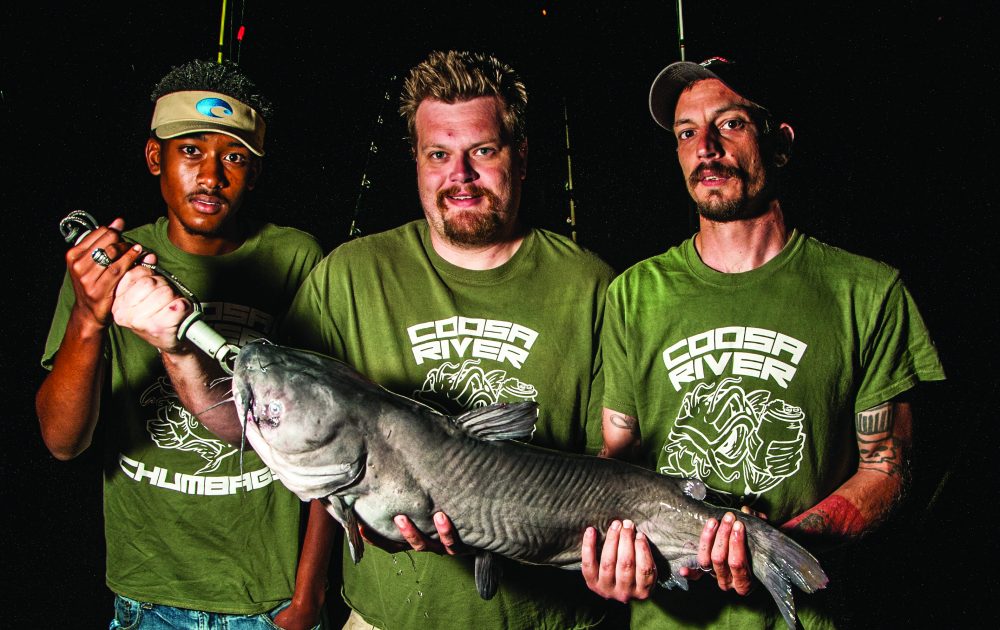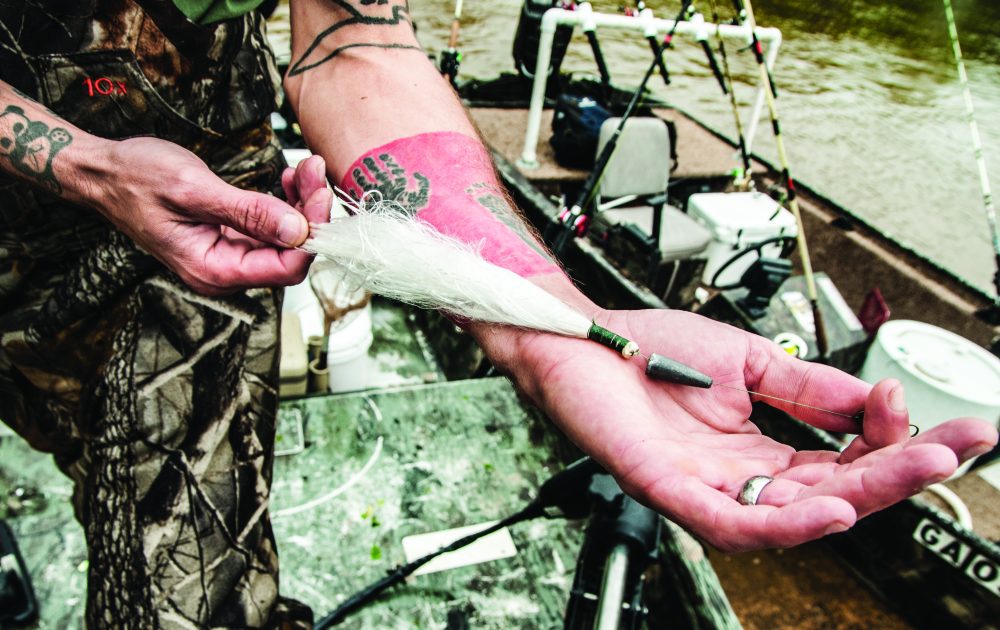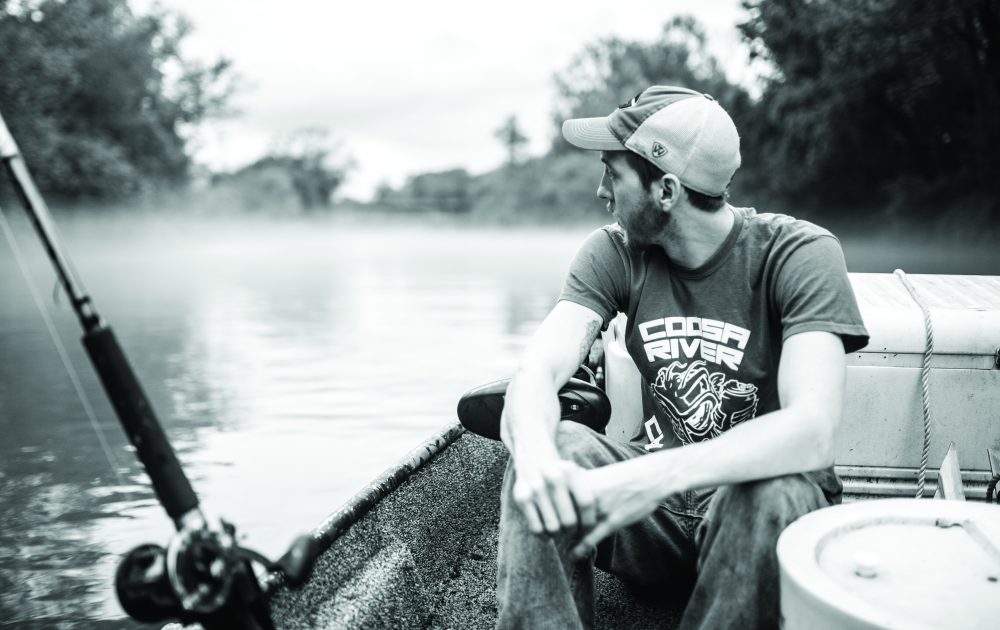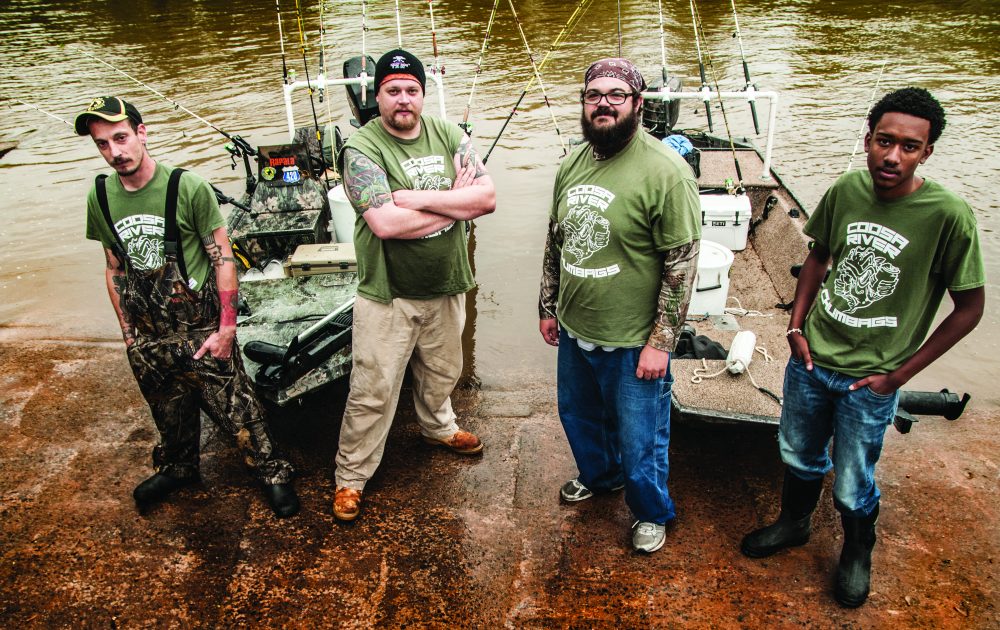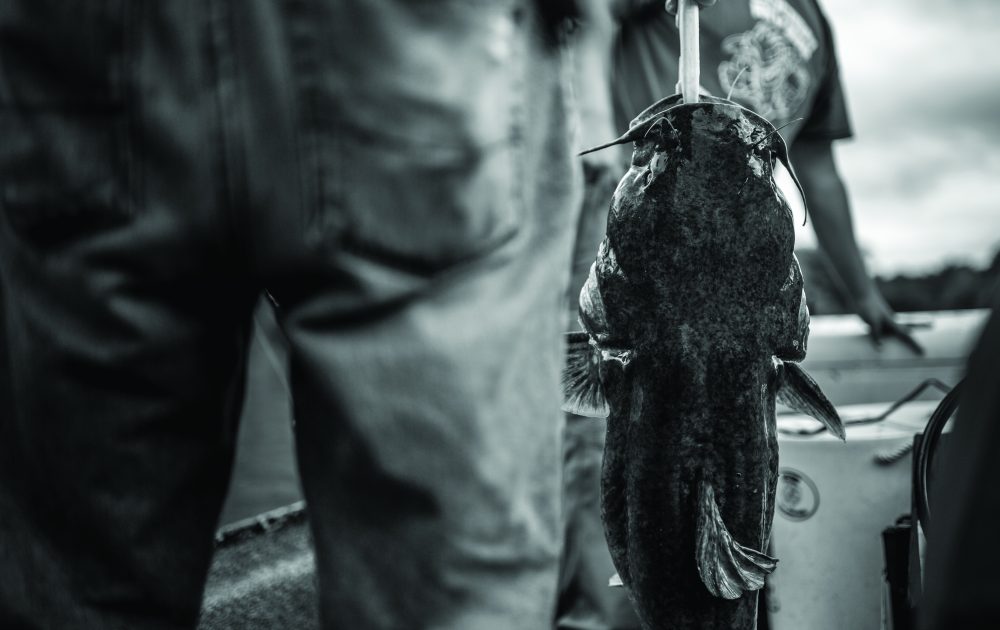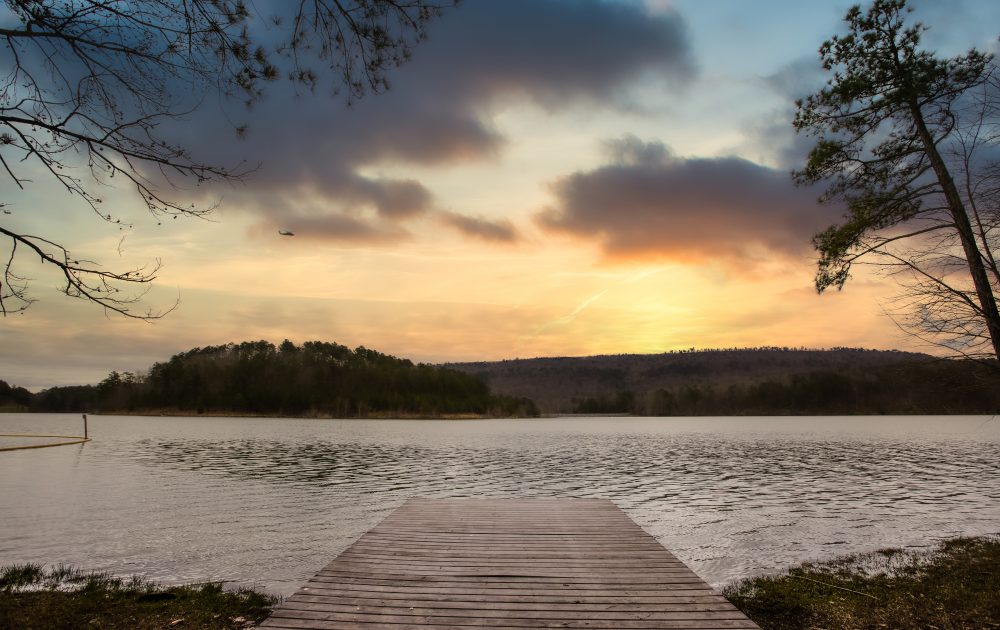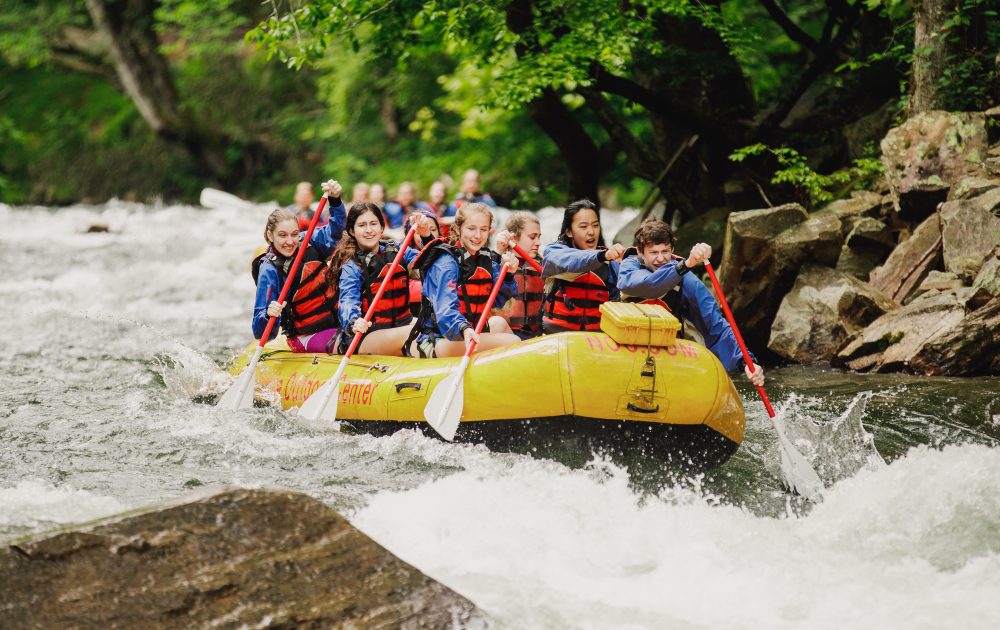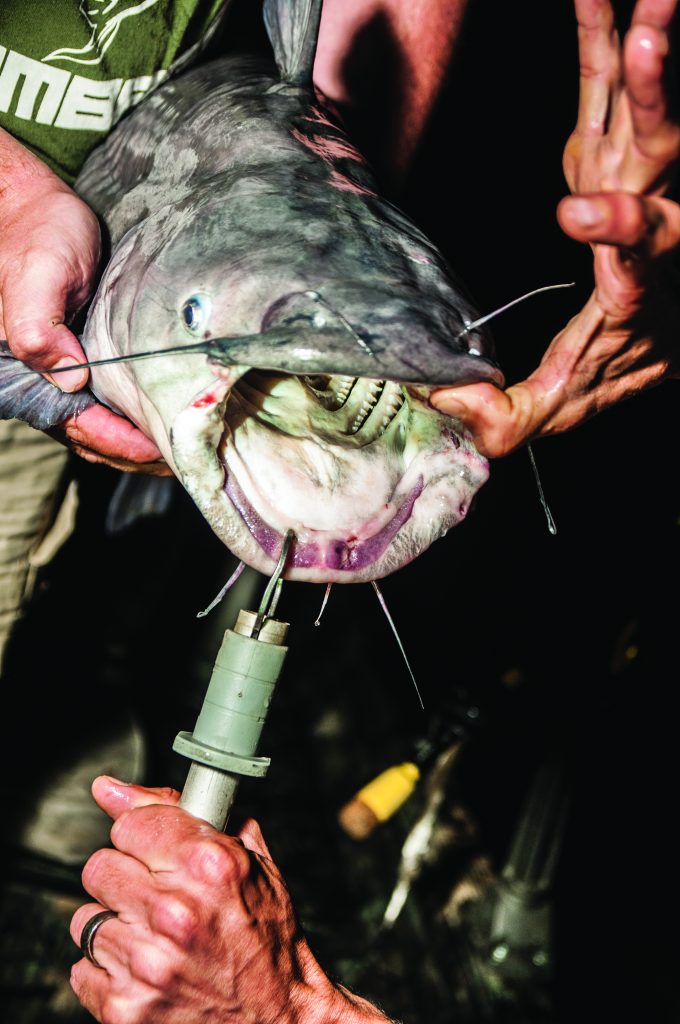
Photographs by Derek Bell and Cameron Flaisch
Tufts of smoke escape the cigarette that hangs slanted from Jedd Lovel’s lips as he relieves a wide, round hook from the defeated mouth of a small-scale catfish.
”That’s eatin’ size right there,” he smiles.
This particular trip, the bow of Lovel’s camouflaged boat cut through the lazy morning fog still hovering above the murky green, but dusk is when the Coosa River Chumbags usually break water.
A group of friends who live on and take pride in the rivers of Rome, the Chumbags approach the waters with unbridled banter, true sailor-style vernacular, and a hell of a love for the catch.
Lovel (Capt. Quest), Zack Williams (Capt. Chumbag), Anthony Johnson (First Mate Cutbait), Miles Threadgill (Threadfin), Sarah McAbee, Luke Allmon (Deckhand Luke) and Evan Mather make up the current crew. Any chance they get, they ride the waters and wrestle the fish for the thrill of it – all willing to get wet, get dirty, and receive high levels of mockery.
For some, like 18-year-old, Threadgill, and 31-year-old Williams, fishing has been a way of life since childhood.
“I don’t remember when I didn’t fish,” Williams says. “My dad and my great-grandmother used to take me every weekend; I would trade bass lures with my little cousin instead of baseball cards.”
It comes as no surprise that, for Williams, the boat came before the car.
When the thirst for bigger fish washed over him, Williams ventured down the rivers on his own accord, reading about the catch, researching the banks and literally testing the waters to find out how to catch one of those “Volkswagen-sized” catfish he heard so many stories about.
“I’ve got stacks of books from just trying to figure out how to get to ’em, how to meet one of ’em, you know,” he grins. “I wanted to hold one of ’em.”
Through work at Harvest Moon in downtown Rome, Williams and Johnson connected five years back, each wanting to introduce the other to their catch of choice – the former fancying catfishing and the latter, a bass fisherman. The first time they hit the river together, not 20 minutes passed before they’d wrestled and caught a big, slimy 40-pound catfish.
“Before I met Zack, I never knew that a catfish that big existed,” Johnson says.
He was hooked and so began his shift from avid bass fisherman to hunter of monsters. Lovel was reeled in on the hunt shortly after and, together, these three Chumbags have run the waters of the Coosa ever since.
Weaving through the channel markers of Brushy Branch at 9 a.m., Lovel and Threadgill are tossing their cast net, hunting for bait, preferably shad (small fish in the herring family).
“When it’s hot outside, you’ll see ’em flipping on top of the water,” Lovel says, gesturing toward the river. “A lot of it’s just looking out for ’em and trying to anticipate their next move. We might throw this thing in the water 30 times and get three fish. The bait is everything. Big bait, big fish.”
While he attests to using everything from shad to skipjack to chicken liver, he usually sticks to what the fish know and want. “I personally like to use what they eat every day,” he says.
And in the waters of the Coosa, the shad run rampant; the perfect grub for what Lovel likes to call “big ol’ nasty catfish.”
The Chumbags get their kicks from catching flathead catfish, gar and striped bass (stripers). Armed with ‘no roll’ weights, three-way swivels, 30-pound braided line, round hooks, and a cast net, they board their boats for river monster battles that last from the bottom of the river to the hull of the boat.
For these guys, it’s all about the pursuit.
“You can catch a big bass and it’ll put up a really good fight. But, when you catch a 40-pound catfish, you can feel it on the bottom shaking its head and running you under the boat. You’re fighting it!” Johnson exclaims.
The fight becomes a contest of strength, a give and take between man and monstrosity.
“They’re gonna pull, you’re gonna reel and pull back slowly … then reel on your way down and pull back,” Lovel says. “That’s how I do it. Let ’em wear themselves out; don’t get in a hurry.”
The gar, however, challenge the Chumbags to an egregious, aquatic game of cat and mouse.
“If you target gar, you’re not going to be sitting on anchor, throwing a rod out and waiting. You’re going to be standing at the front of the boat, going in circles, looking for ’em,” Williams explains. “Instead of waiting on the fish to come to you, you’re actively hunting these.”
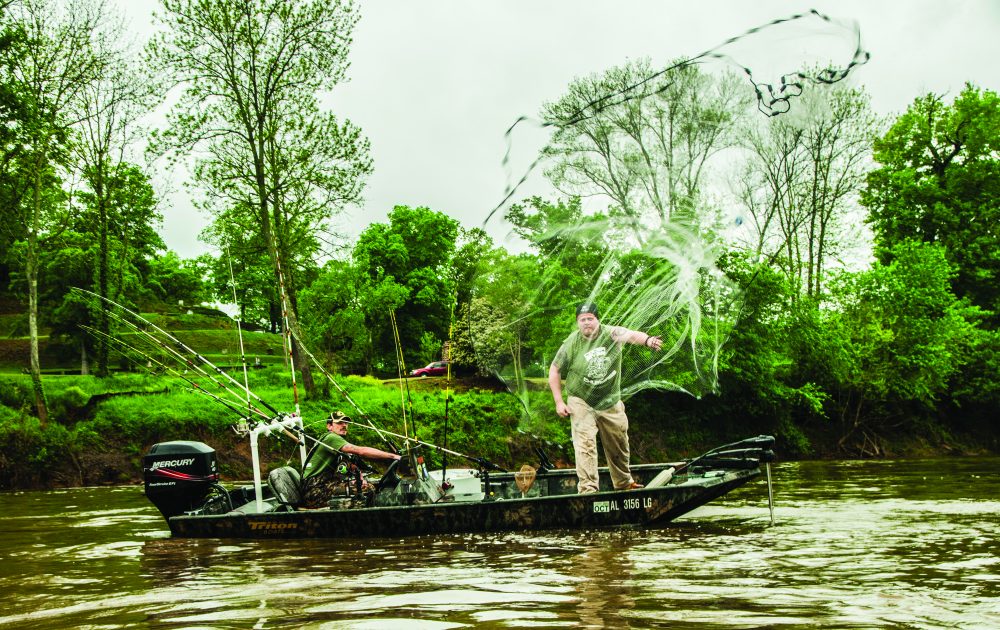
For gar, the Chumbags make their own rope lures, braided and frayed to catch and tangle in the primitive fish’s sharp teeth.
An encounter between Johnson and a three-and-a-half-foot-long gar nearly gave Lovel his first overboard experience. After the fight, Johnson grasped his prized catch with gloved hands and posed for a picture.
“I snapped the picture,” Lovel recalls. “…and right after that moment, that gar jumped and when it twisted, it went with some fury. It landed just inches from my bare feet.”
Given the jagged, armored, plate-like scales of the gar, from which the guys have gotten many a gash, Williams relates a loose gar to dropping a saw in the middle of the boat. Meanwhile, Lovel’s failed attempt to take refuge up on the seat of the boat sent him falling toward the waters from which they retrieved the monster – saved in the last second by Johnson grabbing the back of his britches. That day, the guys quickly learned that gar won’t stick around for the photo op.
The guys admit there’s no secret to making that big catch and it’s really just trial and error. “Fish move; they don’t stay in one spot forever,” Lovel says. “So, if you’ve had good luck in one place one day, there’s absolutely no guarantee that you’ll catch another one there.”
What they do know is that they have the best luck during the magic hour – one hour after daylight and one hour before dark.
You may catch the Chumbags roaming Brushy Branch in the early morning or scouring the channel of the Coosa in the evening, and almost every year they’re out at Brushy for the Coosa River Catfish Tournament. On April 26, the Chumbags hit this year’s catfish tourney with a centrifugal force split between two vessels. In one boat, Lovel, Threadgill and Mathers proudly took fourth place, and in the other, Williams, Johnson and Allmon left the Coosa with the gold, their catch clocking in at just under 30 pounds.
All of the Chumbags have their reasons for rolling on the river and reeling in the big ones.
“It’s my therapy,” Johnson says. “Some of the best views of Rome are on the river.”
Lovel recalls a 4th of July on the river, four poles in the water, watching the sparkle and glow of the fireworks under the black night sky.
“It teaches me patience,” he says.
They all agree that being on the water is better than a lazy day in front of the TV; they’re in it for the big fish, the peace and the pursuit.
“It’s quality over quantity,” Johnson says. “I will sit all day on the bank, staring up at four fishing poles not moving, to wait for that one big fish.”
And sometimes they don’t catch anything – enjoying every minute of it, just hanging out with friends on the river.
“We tend not to go without each other,” Williams says. “If we go fishing, we’re gonna call the other ones and at least offer because nobody likes to be left on the bank.”
In fact, the Chumbags added their newest family member in October last year when Williams and McAbee welcomed their baby girl, Amelia. There is no doubt that this little girl will be out on the water alongside her parents very soon.
Family is important to the Chumbags; they see each other through the good and the bad. When Johnson lost his home and his boat in a tragic fire, he was met with complete support and compassion from his fishing community. Threadgill reached out to Johnson and offered some of his own fishing equipment (the Chumbags’ first encounter with Jr.) and Lovel supplied his buddy with a new rod and reel and some tackle.
In the time these guys have been hunting river monsters together, they have definitely racked up their share of stories; learning the hard way is a common theme. Straight from the Chumbags, a few dos and don’ts: good fisherman’s etiquette says that if you see somebody’s fishing jug bobbing against the bank, don’t ever, ever mess with it. If you do mess with it, be prepared with an EpiPen because karma is going to run you straight into a nest full of wasps (take this as literally as you like). If you decide to floor it up a river you don’t usually run, do stay in the river’s channel. And if your buddy is driving his boat and hits a concrete block at 45 miles per hour, do laugh at your own risk.
Forthright, yet warm, Williams adds, “I’d much rather be on the boat with these knuckleheads, not catching fish, than be sitting at home.”

